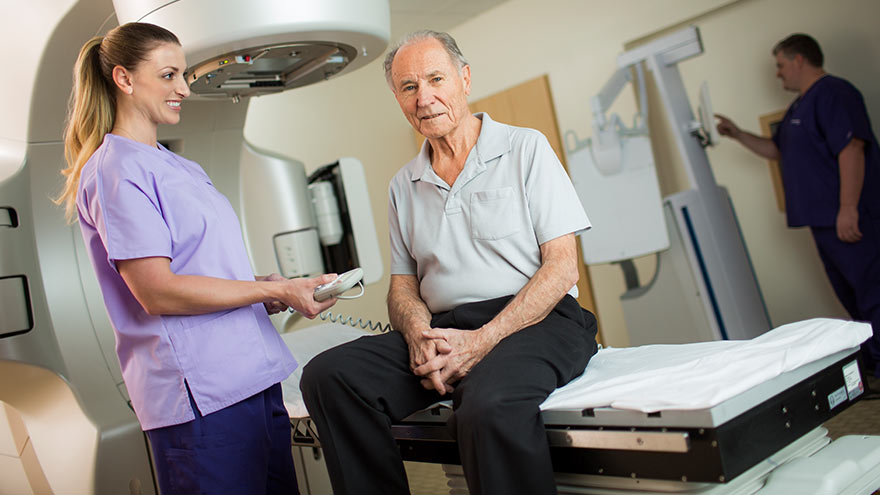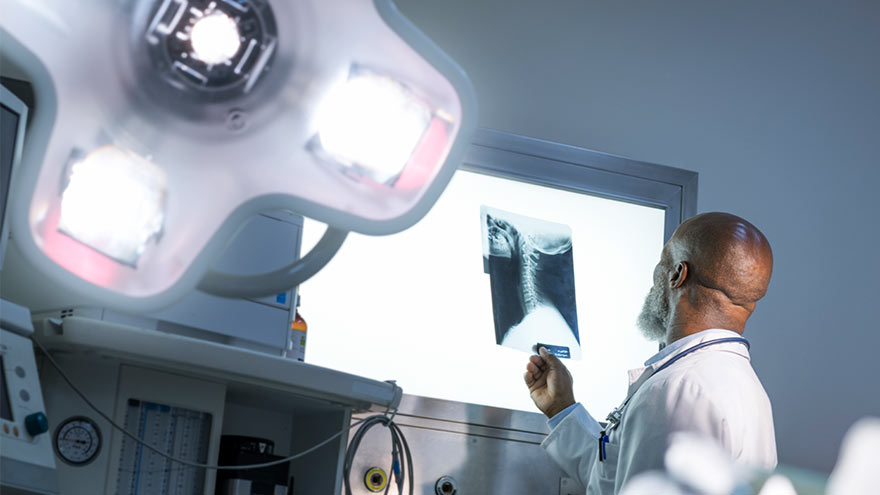Buscar
-
What Is the Importance of Having an Institute for Cancer?
What is an institute for cancer — and why does it matter that we have one right here in Reno? Here, a radiation oncologist answers those questions and more. Sadly, our community health needs assessment shows cancer is the second leading cause of death in Washoe County. But many residents may not know there is an institute for cancer right here in Reno that can care for you or your loved one after diagnosis. Dr. Michael Hardacre, a radiation oncologist with Renown Institute for Cancer is here with more. What is an institute for cancer? The way I like to think of it: An Institute has healthcare providers highly trained in patient-centered care. For example, when you have cancer, many times you’ll see a lot of doctors. A program brings those doctors together — so you really have one team working together. An Institute takes that one step further. Say there are other needs beyond the doctor’s office such as nurse navigators, dietitians, physical therapists to help you get on track, etc. An Institute really proactively thinks of the need of the cancer patient. It then makes sure all those things are available to them throughout their treatment. The term “institute for cancer” identifies a cancer program that is comprehensive and multidisciplinary in nature. For Renown, that means that we have the specialists in medical oncology, surgical oncology and radiation oncology working together with other specialists to assure that a patient has coordinated care throughout the entire treatment course of cancer care. Together with cancer prevention and diagnostics, genetic assessment, supportive care, clinical trials, and cancer survivorship, the institute for cancer provides care for the community, families and patients along the entire spectrum of cancer care. What types of cancer do you treat? We’re fortunate to be able to provide cancer treatments for all types of cancers, and we’re one of the major referral centers for northern Nevada. Most commonly, just like much of the country, lung cancer, prostate cancer and breast cancer are the most frequent we see. Our care spans brain, to neck cancer and everything in between. As an accredited comprehensive community cancer program, Renown Health provides services for all cancer types. The highest volume cancers treated at Renown are breast, colorectal, lung, genitourinary, blood and gynecologic cancers. Most treatments can be done right here in Reno, but when there are specialty needs such as stem cell or bone marrow transplantation, we partner with quaternary centers, like Stanford, to assure a smooth transition of care both to and from the quaternary center. What kinds of care and treatments are offered? We offer a wide range of comprehensive care. We treat the cancer itself — surgical, radiation oncology, medical oncology in the form of chemotherapy or pills. Also addressed: dietary needs, physical therapy and navigation through this whole process. People may be surprised by the scope and scale of the Renown Institute for Cancer. For instance, our Radiation Center has the latest technologies to treat cancers. This includes the Linear Accelerators, which are machines with treatment planning software tools. In addition to the traditional external radiation treatments provided in most centers, Renown performs specialty treatments using High-Dose Brachytherapy, a treatment with an active radiation “source” and in Brain Stereotactic Radiosurgery, assuring that patients can stay right here in northern Nevada — close to home. What does that mean for the quality of care? I think it’s always great in any environment to have external people come into your program and not only share what’s happening nationally and what we could do better, but also to validate “are you doing things at the highest level you can?” That accreditation process is just one way to give us that seal of approval. We’re lucky enough this year to get the gold award by the American College of Surgeons — its highest honor. We were honored to receive it. Why is important that you’re an accredited institute? Accreditation assures our community that quality is a top priority for us. Each of the accrediting bodies has a set of standards that identify service and quality standards. Renown Institute for Cancer has the following accreditations: American College of Surgeons’ Commission on Cancer: Full Cancer Program accreditation, standards address issues from cancer prevention/diagnosis to treatment to survivorship and/or end-of-life. Renown received the Gold Level Accreditation in 2018, the highest level of accreditation possible; American College of Surgeons’ National Accreditation Program for Breast Centers: Full Breast Center/Program accreditation, standards address issues from breast cancer prevention/diagnosis to treatment to survivorship and/or end-of-life; American College of Radiology – Radiation Therapy: Full Radiation Oncology accreditation for radiation equipment, treatment planning, treatment and treatment follow-up; and American College of Radiology – Mammography Services.
Read More About What Is the Importance of Having an Institute for Cancer?
-
Head, Neck and Oral Cancers: How You Can Spot and Treat Them
Head, neck and oral cancers account for just 3 percent of all cancer in the U.S. and can be hard to diagnose. Dr. Abhinand Peddada, radiation oncologist with the Renown Institute for Cancer, explains. While you likely don’t frequently hear about head, neck and oral cancers — they are significantly less common than many kinds of cancer — they can be extremely dangerous. One of the primary reasons: some symptoms mimic the common cold, making them difficult to detect without a medical professional. We asked Abhinand Peddada, M.D., radiation oncologist with the Renown Institute for Cancer, to break down the symptoms and lifestyle risks of these rare cancers. First off, what are some of the signs and symptoms of head, neck and oral cancers? Symptoms can vary based on where the cancer is. For example, throat cancer may show up as a persistent sore throat, while sinus cancer may present as soreness or pressure in the sinuses that doesn’t get better. Some other symptoms to watch may include: Swelling in the throat Painless swelling in the neck Red or white patches in the throat Hoarseness Bloody noses or blood in the mucus or saliva A new and unexplained lump or bump anywhere on the face, neck, mouth or throat Difficulty breathing Difficulty swallowing, chewing or moving the muscles in your face, neck, mouth or throat Bad breath, even with good oral hygiene Loose teeth Dentures or retainers that no longer fit Double vision Who is most at risk for head, neck and oral cancers? Both men and women can develop head, neck and oral cancers, but men are at almost twice the risk of women. People over the age of 40 are also at a higher risk, and these cancers tend to be more common in African Americans. Tobacco use — including cigarettes, cigars, pipes and chewing tobacco — is another risk factor. Tobacco is linked to 85 percent of head and neck cancers. Exposure to fumes and chemicals can increase your risk as well. We’re also seeing more HPV-related head and neck cancers in the U.S., so patients with HPV may want to watch more closely for symptoms. What about screening and prevention? Your dentist already looks for signs and symptoms at your regular dental checkups. Additionally, if you have one of these risk factors and are experiencing signs and symptoms, it’s a good idea to check with your doctor about possible screenings. To help prevent these types of cancers, try to minimize your controllable risk factors. This means quitting tobacco, watching your alcohol consumption and taking care of your oral hygiene by brushing and flossing regularly. We also recommend the HPV vaccination for both boys and girls starting at age 11. By vaccinating at an earlier age, one is less likely to develop oral HPV. What do diagnosis and treatment look like for these cancers? At Renown Institute for Cancer we offer the most advanced diagnostic testing available including fiberoptic photos, CT and PET scans, as well as MRIs. Together, you and your care team will decide which treatment best fits your needs. For these types of cancers, treatment options include radiation, chemotherapy and surgery. Renown Institute for Cancer | 775-982-4000 At the Renown Health Institute for Cancer, our experienced team provides the support and care to maintain the highest quality of life and then achieve the best possible outcome, all in one location that’s close to home. Our dedicated team, clinical expertise and advanced treatment options allow us to tailor care to each patient. Learn about: Our Team Cancers We Treat Screening and Prevention Treatment Options Find a Cancer Doctor
Read More About Head, Neck and Oral Cancers: How You Can Spot and Treat Them

